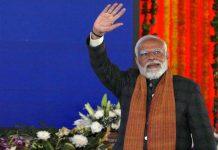 Madras Cafe hasn’t released in Madras, for “alleged portrayal of LTTE in bad light”, as the newspapers put it. For once, the allegations stem not from an overimaginative reaction to a trailer or simple rumours, but empirical evidence: the film was screened for volunteers from pro-Tamil outfits in the hope that they would judge the film on its merits. They did. It failed.
Madras Cafe hasn’t released in Madras, for “alleged portrayal of LTTE in bad light”, as the newspapers put it. For once, the allegations stem not from an overimaginative reaction to a trailer or simple rumours, but empirical evidence: the film was screened for volunteers from pro-Tamil outfits in the hope that they would judge the film on its merits. They did. It failed.
Shoojit Sircar’s film, at first glance, doesn’t seem all that offensive. Anna Bhaskaran (Rathnam), Sircar’s stand-in for Prabhakaran, is no saint, but the film goes to great pains — mostly by having characters reiterate that he is an idealist whenever they mention him — to say he didn’t start the fire. They even have a montage to prove it. But Madras Cafe isn’t really concerned with the whats and wherefores of the civil war. It accepts it as a complex battle of attrition much beyond its ken, and then proceeds to tell the story it wants: that of India’s doomed efforts to undermine the Tigers and the plot to assassinate Rajiv Gandhi (referred to only as PM and, later, ex-PM).
Therein lies much of what has offended Tamil groups. In a spy film, told through the perspective of the Research & Analysis Wing (RAW), the Tigers naturally become the antagonists. Vikram (Abraham), a covert-ops agent, is told at the outset to sabotage Bhaskaran’s LTP and install new leadership in Jaffna (though India’s initial support for the LTTE is glossed over). He fails, the LTP consolidates its strength by allying with a vaguely-defined consortium of foreign companies and intelligence agencies and successfully assassinates Ex-PM. Somewhere along the way, the film crosses the lakshman rekha that often defines which side you are on in the murky LTTE debate — it calls the Tigers terrorists.
With the baggage that comes with the word in the post-9/11 era, taking offence at such a characterisation isn’t simply a matter of semantics. (The film does qualify it with the hackneyed “One man’s terrorist is another man’s revolutionary”.) To its credit, Madras Cafe does not take to black and white with the vim of its Western counterparts. There is no moral justification offered for India’s intervention; in fact, the film makes it clear that the primary reason we went in was pragmatic geopolitics. The Tigers are the bad guys, but not inherently bad. The film treats them more as committed revolutionaries being used by external forces, “economic hitmen” from the aforementioned consortium (a charge that may or may not be true, but is convenient for the film’s balancing act). Unfortunately, this angle — like many others — is never explored, just explained away in a line or two of some of the worst exposition ever done in an espionage thriller.
And it is as an espionage thriller, shorn of political blinkers, that Madras Cafe will be remembered. The exposition isn’t the only thing wrong with it on that count. John Abraham and Nargis Fakhri are equally unconvincing as RAW agent and foreign correspondent respectively. Abraham’s performance is earnest, but amateurish, much like India’s peacekeeping efforts in the film. He keeps insisting that he’ll do it his way, but that mostly involves going for the most obvious course of action and getting backstabbed by the most obvious candidate in the most obvious way possible. The supporting cast isn’t much better. Quizmaster Siddhartha Basu’s acting debut as RAW director Robin Dutt is disappointing; he delivers his dialogue competently, but, especially in the film’s more crucial scenes, he lacks the necessary emotions. One scene, where he meets John after his (John’s) wife has been killed, is probably the most sterile I’ve seen in recent times. The pacing is intermittent, and the film loses any dramatic tension it generates by laboriously explaining itself in trying to seem accessible. It’s still better than most Bollywood films of its genre — things happen between the action sequences, after all — but Madras Cafe is just another well-intentioned but botched exercise.












